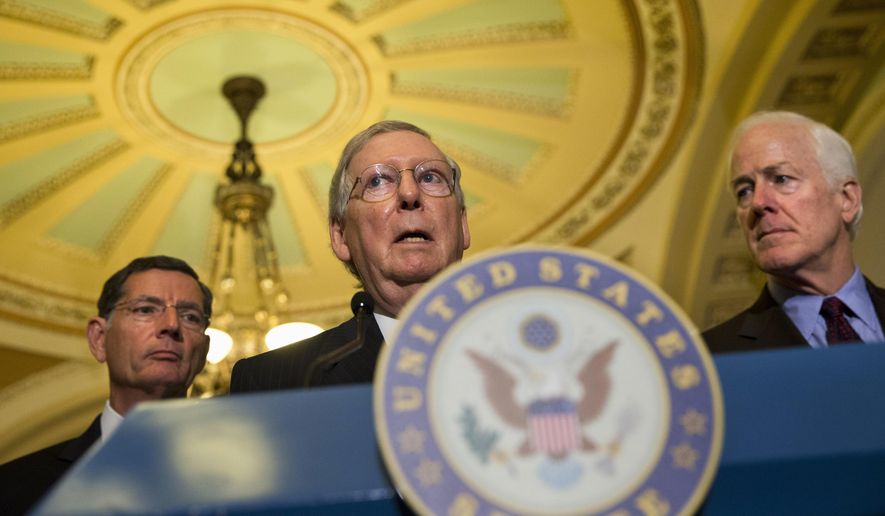The Senate is off to its best year since 1990 by at least one measure, with more than 30 of its bills having been signed into law by President Obama.
Eighteen months into Republican control of the Senate, the upper chamber has settled into a new normal. The partisan fights remain, and senators aren’t spending much time on the floor debating bills — but they are passing them, and at a surprising clip.
All told, including the 31 Senate bills and 42 House-written bills, Congress approved 73 measures that Mr. Obama signed into law from January through the end of June. That’s nearly three times the number of bills approved in the first six months of 2015 and 20 more than in 2014, which was the last year Democrats had control of the Senate.
“The new Republican Congress, under the leadership of Sen. McConnell, operates under a dramatically different approach than the Democrats in the previous Congress,” Don Stewart, a spokesman for Senate Majority Leader Mitch McConnell, said in a statement. “Sen. McConnell opened the Senate, and despite efforts by the Democrat leadership to block bipartisan legislation, we have returned to a more functioning Senate, and allowed senators to participate in the legislative process. While this isn’t the easy way, it allowed members to have more than dysfunction to show for their time in the Senate.”
Democrats say Congress doesn’t deserve the platitudes.
They point to a host of issues that they say Congress has ducked, including their push for more gun control in the wake of the lone-wolf terrorist attacks in Orlando, Florida.
Democrats also bemoan the schedule Mr. McConnell has followed.
The majority leader, a Kentucky Republican who assumed control in early 2015, had scheduled the Senate to work five-day weeks — but that has been the exception rather than the rule. The last time the Senate spent less time in session during the first six months of the year was 1989.
Less time has meant fewer floor votes, too. Senators have been called to the chamber for roll call votes just 117 times through June, marking the worst start to a second session since 1966.
It’s about to get worse. Once Congress finishes this week, it will go on a seven-week recess to give both parties a chance to hold presidential nominating conventions, ahead of a five-week August break.
“Republicans are on pace to work the fewest days that the Senate has worked in more than 60 years. Sixty years ago, the country was much, much smaller, a lot fewer people here, a lot less business, but even with that, we’re working less than they did 60 years ago,” Senate Minority Leader Harry Reid, Nevada Democrat, said on the chamber floor two weeks ago, pleading with Republican leaders to stay in session to keep debating bills.
Both the number of bills signed into law and the amount of time spent in session are tracked as part of The Washington Times Legislative Futility Index — a measure of how much Congress is doing in Washington.
The index, which relies on 70 years of statistics compiled in the Congressional Record, looks at the number of hours spent in session, the number of pages added to the Congressional Record, the number of floor votes, the number of bills approved by each chamber and the number of bills signed into law.
Congress hit the doldrums in the early part of this decade when Democrats controlled the Senate and Republicans held the House, and they careened from crisis to crisis.
Things have improved since Republicans took control of the Senate, unifying Congress and clearing some of the roadblocks.
The Senate still ranks very low in terms of time in session and number of votes, ranks slightly below average in amount of legislation handled, but is above average in terms of getting its own bills into law. The House, meanwhile, under Speaker Paul D. Ryan, Wisconsin Republican, ranks below average in time in session but is above average in bills considered and votes taken.
Battles with Mr. Obama, backed by Democrats’ power to filibuster in the Senate, have continued to stymie many measures.
One of the current fights is with a Republican bill to combat the Zika virus. The legislation adopts the Senate’s compromise funding figure of $1.1 billion but offsets about two-thirds of that with cuts elsewhere, as House Republicans wanted.
Mr. Reid has said it’s too little and comes with too many strings attached — including language that would prevent Planned Parenthood from gaining access to the money.
Republicans say they are in control, the deal has been struck and it’s the only bill that can be signed into law before Congress returns in September.
Of the more than 70 bills that have passed Congress so far this year, many are housekeeping bills. But some midlevel legislation has cleared, including a hard-fought compromise to rescue Puerto Rico from a crippling debt burden; a bill to stiffen enforcement of customs laws, which was part of last year’s free trade compromise; and open-records legislation that pushes federal agencies to release more information to the public.
Up next is a test for Mr. Reid on opioid abuse.
The House last week easily cleared a compromise that pushes federal alternatives to incarceration for opioid and heroin abusers and expands access to Naloxone, a drug that can treat opioid overdoses. But the legislation doesn’t include the extra money Democrats want.
Mr. McConnell has set up a final showdown vote this week on the opioid bill, as well as a revote on the Zika compromise.
• Stephen Dinan can be reached at sdinan@washingtontimes.com.




Please read our comment policy before commenting.